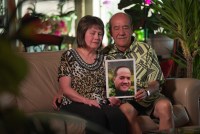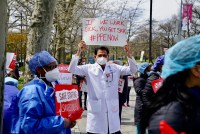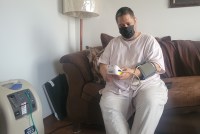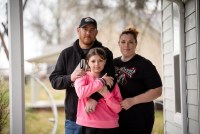Latest KFF Health News Stories
A Battle Between Drugmakers and Insurers Hits Patients in the Wallet
There’s a long-running battle between insurers and drugmakers over financial assistance programs that purport to help patients afford expensive drugs. And lately, insurers have been losing ground as lawmakers, regulators and courts weigh in. The issue is whether coupons and other copay aid many patients get from drugmakers should count toward annual insurance deductibles and […]
Watch: Many Americans Are Unaware of HIV Prevention Medication
Some Americans mistakenly believe medication to prevent HIV transmission through sex is just for certain groups such as gay men, but anyone who’s at risk for contracting HIV through sex could benefit.
Needle Pain Is a Big Problem for Kids. One California Doctor Has a Plan.
The pain and trauma from repeated needle sticks leads some kids to hold on to needle phobia into adulthood. Research shows the biggest source of pain for children in the health care system is needles. But one doctor thinks he has a solution and is putting it into practice at two children’s hospitals in Northern California.
Georgia’s Medicaid Work Requirements Costing Taxpayers Millions Despite Low Enrollment
Republican Gov. Brian Kemp’s Georgia Pathways to Coverage program has seen anemic enrollment while chalking up millions in start-up costs — largely in technology and consulting fees. Critics say the money’s being wasted on a costly and ineffective alternative to Obamacare’s Medicaid expansion.
La nueva ola de propuestas estatales, impulsada por familias que perdieron familiares después de enfrentamientos con la policía, marca un paso importante para desterrar un término que los críticos dicen que incita a la policía a usar fuerza letal en exceso.
Under Fire for Massive Health System Hack, Biden Team Leans on Insurers
The Biden administration has hit on a strategy to deal with the massive, industry-paralyzing cyberattack on a UnitedHealth Group unit: pressuring insurers to fix it. Federal officials have been in constant conversation with senior leaders at UnitedHealth and across the industry, including at a Monday meeting where Department of Health and Human Services and White […]
Health Workers Fear It’s Profits Before Protection as CDC Revisits Airborne Transmission
Four years since the covid pandemic emerged, health care workers want rules that protect them during outbreaks. They worry the CDC is repeating past mistakes as it develops a crucial set of guidelines for hospitals, nursing homes, prisons, and other facilities that provide health care.
As money flows to abortion rights initiatives in states, some donors focus on where anger over the “Dobbs” ruling could propel voter turnout and spur Democratic victories up and down the ballot, including in key Senate races and the White House.
Amid Mental Health Staffing Crunch, Medi-Cal Patients Help One Another
Peer leaders can help ease the shortage of mental health providers and build trust through shared experiences, state health officials say. In 2022, California started allowing counties to use Medicaid dollars to pay them for their work.
Cuando tu cobertura de salud dentro de la red… simplemente se esfuma
los contratos de las aseguradoras con médicos, hospitales y farmacéuticas (o sus intermediarios, los llamados administradores de beneficios farmacéuticos) pueden cambiar abruptamente de la noche a la mañana.
As More States Target Disavowed ‘Excited Delirium’ Diagnosis, Police Groups Push Back
After California passed the first law in the nation to limit the disavowed term “excited delirium,” bills in other states are being introduced to help end use of the diagnosis. But momentum is being met with resistance from law enforcement and first responder groups, who cite free speech.
Covid and Medicare Payments Spark Remote Patient Monitoring Boom
Demand for help monitoring patients’ vital signs remotely has taken off since a Medicare change in 2019. Dozens of companies now push the service to help overburdened primary care doctors — and as a revenue stream. But some policy experts say its growth has outpaced oversight and evidence of effectiveness.
Joe Biden’s Skittish Support for Abortion Rights
President Biden spent much of his State of the Union speech last week talking about two subjects central to his reelection campaign while seemingly trying not to name them. One was Donald Trump, or as Biden called him, “my predecessor.” The other was abortion. It’s hardly news that Biden, an 81-year-old devout Catholic, is uncomfortable […]
How Your In-Network Health Coverage Can Vanish Before You Know It
One of the most unfair aspects of medical insurance is this: Patients can change insurance only during end-of-year enrollment periods or at the time of “qualifying life events.” But insurers’ contracts with doctors, hospitals, and pharmaceutical companies can change abruptly at any time.
A New Orleans Neighborhood Confronts the Racist Legacy of a Toxic Stretch of Highway
New federal funds aim to address an array of problems created by highway construction in minority neighborhoods. These are economic, social, and, perhaps above all, public health problems. In New Orleans’ Treme neighborhood, competing plans for how to deal with harm done by the Claiborne Expressway reveal the challenge of how to mitigate them meaningfully.
When Copay Assistance Backfires on Patients
Drugmakers offer copay assistance programs to patients, but insurers are tapping into those funds, not counting the amounts toward patient deductibles. That leads to unexpected charges. But the practice is under growing scrutiny.
Montana, an Island of Abortion Access, Preps for Consequential Elections and Court Decisions
A 25-year-old state Supreme Court ruling protects abortion rights in conservative Montana. That hasn’t stopped Republicans and anti-abortion advocates from trying to institute a ban.
They Were Injured at the Super Bowl Parade. A Month Later, They Feel Forgotten.
In the first of our series “The Injured,” a Kansas family remembers Valentine’s Day as the beginning of panic attacks, life-altering trauma, and waking to nightmares of gunfire. Thrown into the spotlight by the shootings, they wonder how they will recover.
Exclusive: Social Security Chief Vows to Fix ‘Cruel-Hearted’ Overpayment Clawbacks
New Social Security Commissioner Martin O’Malley is promising to change how the agency reclaims billions of dollars it wrongly pays to beneficiaries, saying the existing process is “cruel-hearted and mindless.”
GOP-Led States Expand Crackdowns on Transgender Care
South Carolina’s legislature is poised to pass a bill prohibiting doctors from offering some health-care services to transgender minors — part of a new wave of anti-trans legislation from Republican-led states. The South Carolina bill, which passed the state House of Representatives in January and is under consideration in the Senate, would bar health-care providers […]





















